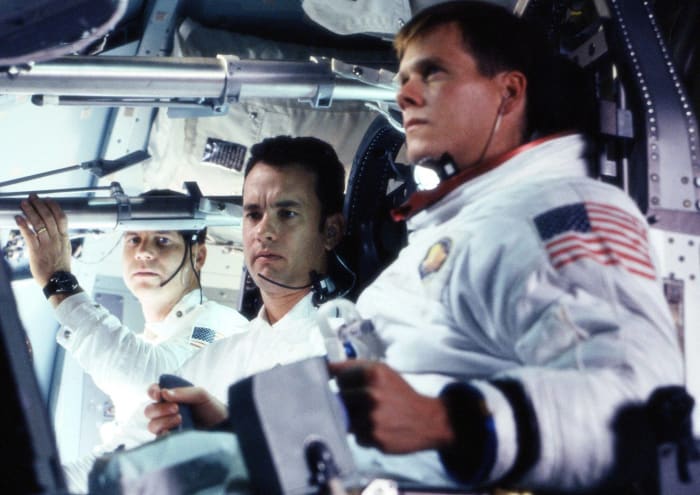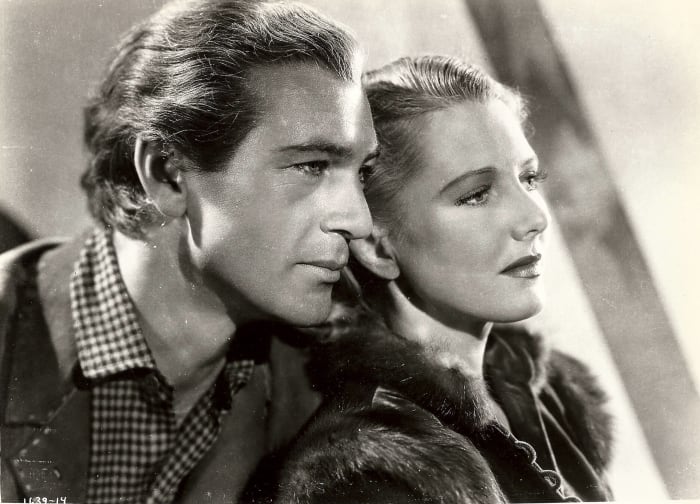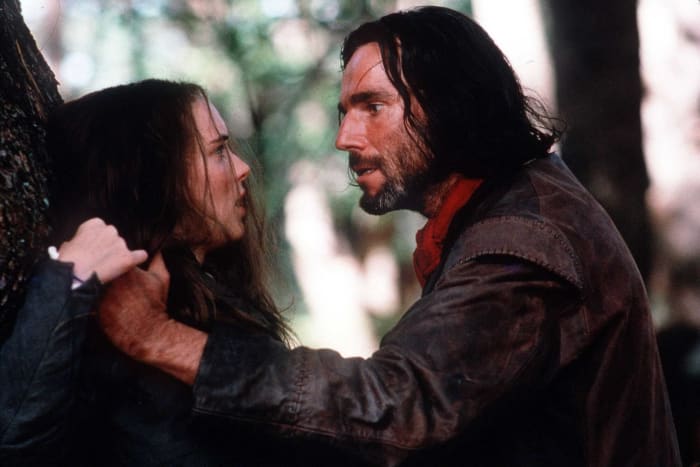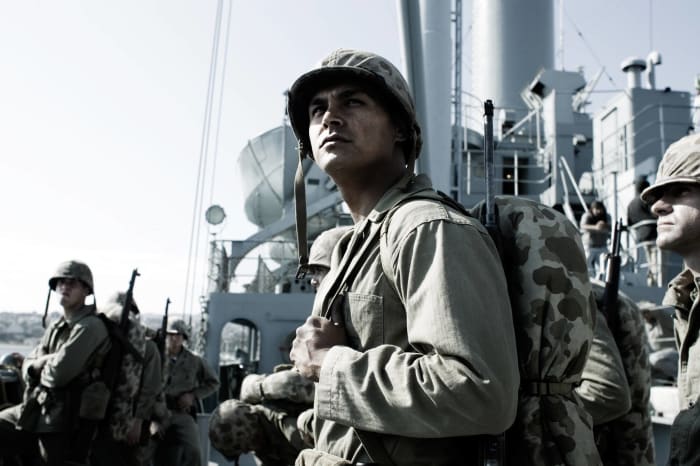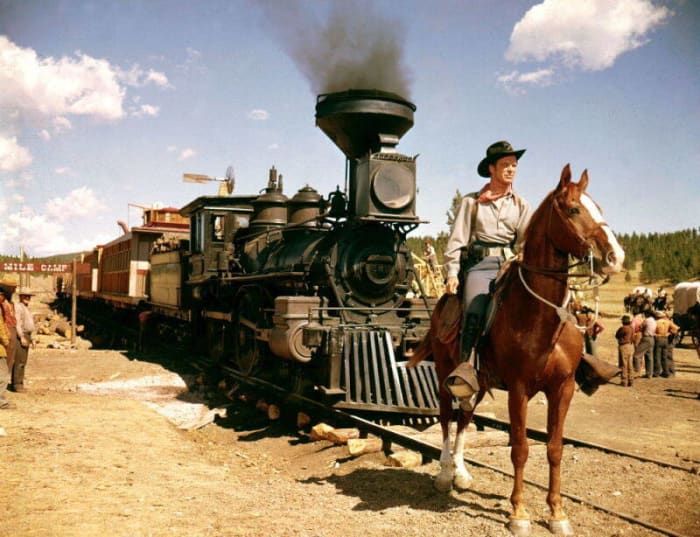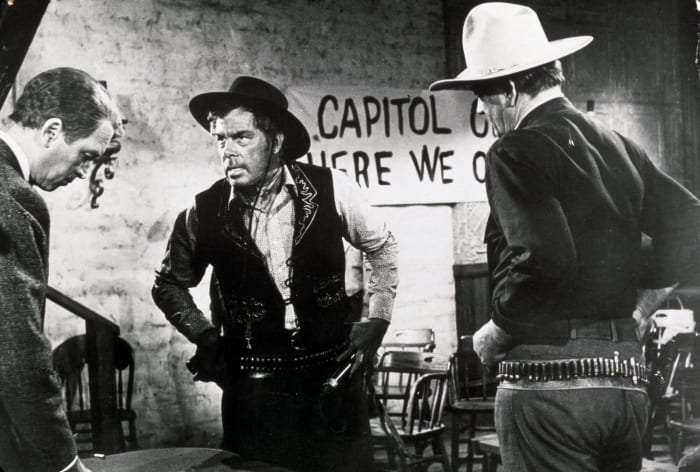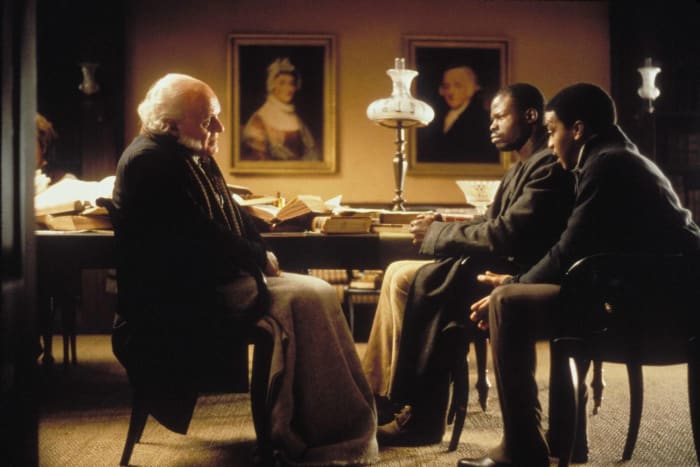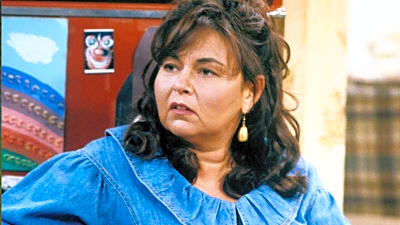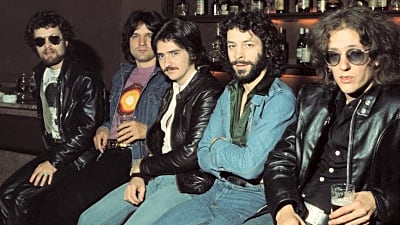Hollywood has unsurprisingly often turned to history in its search for compelling stories and narratives, and it has been particularly invested in bringing America’s past to vibrant life on the screen. Whether in the form of a biopic or a historical epic — a costume drama or a fictionalized piece of history — these films convey something meaningful and resonant about the country’s past and how it continues to impact the present. More than anything else, the best movies about American history allow for a keener, more complex understanding of how those living in the present make sense of what has come before as they try to figure out where to go in the future.
1 of 25
'The Watermelon Woman'
First Run Features via MovieStillsDB
Some of the best films about American history call attention to the very act of writing history itself. This happens in The Watermelon Woman, which focuses on a young Black lesbian who sets out to make a documentary about a largely forgotten African-American actress. It has a biting sense of humor but also shines a sharp light on how those in power ensure that some people are written down and remembered by history and others are primarily forgotten or pushed into the margins. In that sense, it remains as powerful and necessary today as it was released in 1996.
Strand Releasing via MovieStillsDB
For many people, the riots that occurred at the Stonewall Inn in New York City in 1969 were the moment when the Gay Rights Movement got its start. The events leading up to that fateful evening are dramatized in the 1995 film Stonewall (not to be confused with a later film of the same title). The film's central romance is between Matty Dean, fresh to New York City, and the drag queen La Miranda. What sets this particular film apart from others is its willingness to focus on the BIPOC who were so key to the riots without losing sight of the romance at the core of the film’s narrative.
Universal Studios via MovieStillsDB
Apollo 13 is a rousing drama and a remarkably accurate depiction of science. As its title suggests, it focuses on the Apollo 13 mission to the moon and the events that led to its being aborted. Ron Howard is at his directorial best with Apollo 13, and the film is further grounded by strong performances from some of the biggest names of 1990s Hollywood: Tom Hanks, Kevin Bacon, and Bill Paxton. As such, it’s a fascinating portrait of both the 1990s that produced and how this decade looked back at the end of the Space Race and the beginning of the 1970s.
4 of 25
'Bonnie and Clyde'
Warner Bros via MovieStillsDB
Warren Beatty and Faye Dunaway deliver stunning performances in Bonnie and Clyde, one of the most remarkable films to have emerged from the period known as New Hollywood. Though it is very much about the fateful meeting of these two larger-than-life criminals and their various escapades in Depression-era America, it is also a fascinating artifact from the 1960s and the air of resistance and chaos in the air. Furthermore, its mix of sex and violence — though somewhat tame by today’s standards — was nevertheless quite groundbreaking for Hollywood at the time, which helps to explain the film’s enduring importance.
5 of 25
'Dances with Wolves'
Orion Pictures via MovieStillsDB
The 1990s saw the resurgence of two film genres that had somewhat fallen out of fashion: the epic and the western. In Dances with Wolves, these two genres come together in spectacular fashion. Kevin Costner gives a masterful performance as John J. Dunbar, a Union soldier who ends up stationed on the frontier. As the film proceeds, he comes into contact and forms a close bond with the nearby Lakota. Though it can sometimes be a bit too one-dimensional in its attempts to honor Native Americans and their vanishing way of life, it is still a grand epic western with a strong, emotionally resonant story at its core.
A24 via MovieStillsDB
The Witch is, among other things, the directorial debut of Robert Eggers. Set during the 17th century, it follows a family of English colonists exiled to the woods surrounding a Puritan town, where they start to encounter the malevolent powers of a nearby witch. It’s a beautifully shot, exquisitely acting, and deeply disturbing film about the power of superstition. Just as importantly, it acts as something of a modern-day folktale, immersing the viewers and the characters in the primordial darkness of the earliest days of European settlement of the American continent.
7 of 25
'Saving Private Ryan'
Dreamworks via MovieStillsDB
Time and again throughout his career, Steven Spielberg has shown that he has a particular knack for knowing how to tap into the American zeitgeist. In Saving Private Ryan, he crafts an exhilarating, devastating, and deeply resonant film about the Second World War. In addition to the central narrative, which focuses on a group of soldiers attempting to rescue the titular Private Ryan, the film is also notable for its extremely realistic depiction of the events of D-Day. Spielberg manages to find the human heart and emotions of the story without losing sight of the grim and bloody nature of combat.
Paramount Pictures via MovieStillsDB
During his many decades in Hollywood, Cecil B. DeMille was one of the directors whose name became most associated with sprawling historical epics. In The Plainsman, he turned his attention to some of the most notable and famous figures of the American West, including Wild Bill Hickok, Calamity Jane, and Buffalo Bill Cody. As he would so often in his career, DeMille managed to capture just the right balance between the big set pieces one expects of an epic and the smaller, more intimate dramatic moments that ground the story. It also features some strong performances from the cast, which includes such Hollywood greats as Gary Cooper and Jean Arthur.
20th Century Fox via MovieStillsDB
The Crucible remains one of Arthur Miller’s best-known plays. In 1996, it was made into a film starring Daniel Day-Lewis, Winona Ryder, and several others. As with the play, the film is a scathing indictment of the Salem Witch Trials and the groupthink they exemplified. It's a remarkably haunting film, largely thanks to the powerful performance from Daniel Day-Lewis, who portrays the doomed but noble John Proctor. Though it might not have quite the bite as the play — given that the film was released after the end of the Cold War and its attendant hysteria — its message about the dangers of falling prey to mass delusion remains as important as ever.
New Line Cinema via MovieStillsDB
Terrence Malick is a truly unique director, and his films are often thought-provoking and contemplative, stylistic meditations on the nature of life and the universe. In The New World, he turns his attention to a significant moment in American history, the founding of Jamestown. It boasts a powerful cast, including Colin Farrell as John Smith. While many of the events it depicts are no doubt familiar, such is the power of Malick’s directing that makes the viewer feel as if they are encountering all of the strangeness of this brave and perilous new world along with the characters.
11 of 25
'Flags of Our Fathers'
Dreamworks via MovieStillsDB
World War II was undoubtedly one of the most significant events in the 20th century, and it left an indelible mark on the American historical consciousness and popular culture. In Flags of Our Fathers, Clint Eastwood examines the circumstances surrounding one of the most iconic and memorable photos to have emerged from the war: Raising the Flag on Iwo Jima. Though it never loses sight of the genuine heroism shown by the soldiers during the conflict, it also shines a light on the way that those in power often use such heroism to manipulate the public.
Columbia Pictures via MovieStillsDB
For obvious reasons, the founders of the United States have repeatedly starred as the subjects of many great films. One of the most notable is 1776. A film adaptation of the enormously popular musical of the same name, as its title suggests, it focuses on the various events that preceded the Declaration of Independence. Long before Hamilton became a phenomenon, 1776 explored the psyches and motivations of the men willing to sacrifice their lives so that a new nation could be born. Its inclusion of some of the actual letters and words of the Founders helps to ground it in the realm of historical reality.
13 of 25
'How the West Was Won'
MGM via MovieStillsDB
The 1950s and 1960s were a golden age for sprawling historical epics that told moving stories about peoples and nations, and one of the most extraordinary of such efforts was How the West Was Won, released in 1962. As its title implies, this story is about the United States' westward expansion. It remains a marvel of cinematic technology, given that it was originally exhibited in the immersive widescreen technology known as Cinerama. The film invites viewers to feel they are a part of the foundational myths that remain key to America’s identity and history.
14 of 25
'The Man Who Shot Liberty Valance'
Paramount Pictures via MovieStillsDB
Many of the best films about American history tend to be nonfiction, but occasionally, a fictional drama emerges that has something significant to say about the past and how it functions to shape the present. This is the case with The Man Who Shot Liberty Valance, one of the very fine Western films directed by John Ford (arguably one of the genre’s most noted auteurs). Starring James Stewart and John Wayne, it’s interested in how history becomes a myth and thus enshrined in the national consciousness. As one character puts it: “When the legend becomes fact, print the legend.”
20th Century Fox via MovieStillsDB
George C. Scott delivers one of the best performances of his entire career in Patton, a biopic focused on George S. Patton, one of the most important generals in World War II. This is one of those cases where the actor and the role genuinely seem to blur together, so complete is Scott’s inhabiting of the Patton persona. Fortunately, the film doesn’t shy away from some of the uglier and less pleasant aspects of the general’s personality, and, like other epic films such as Lawrence of Arabia, it elevates its subject into the realm of an icon.
MGM via MovieStillsDB
Till should be required viewing. Rich, raw, and emotional, it focuses on Mamie Till, whose son Emmett was brutally murdered in one of the most notorious examples of a racially motivated hate crime in the history of the United States. Danielle Deadwyler is a powerhouse as Mamie, a woman determined to get justice for her son, even though doing so means fighting against the entrenched racism of the American South. Though it is sometimes a difficult film to watch, it is precisely this that gives it its extraordinary power.
Dreamworks via MovieStillsDB
Abraham Lincoln is often regarded as one of the best presidents the United States has ever produced, and he has been the subject of numerous biopics. Few, however, have obtained the artistic status of Steven Spielberg’s Lincoln, starring Daniel Day-Lewis in the title role. Day-Lewis is sublime as Lincoln, going beyond imitation and seeming to inhibit the body and soul of his subject. Moreover, the film takes a very limited period — the last several months of the president’s life — to make its case about his presidency and personality. Though it does take some liberties with history, for the most part, it is a remarkably faithful examination of one of the most influential American leaders.
Dreamworks via MovieStillsDB
Steven Spielberg has long shown himself to be a remarkably versatile director, capable of working in many different genres. In Amistad, he once again showed that he has a keen eye for historical drama, and he draws out some great performances from his cast, including Djimon Hounsou, Anthony Hopkins, and Morgan Freeman. The film’s central narrative about the group of enslaved people aboard the Amistad and the court case about their status continues to resonate. Thanks to the heartfelt emotion that Spielberg pours into it, it holds the viewer spellbound from the first frame to the last.
TriStar Pictures via MovieStillsDB
The Civil War remains one of the most important conflicts in American history, leaving many enduring scars. Glory is one of the best films about the conflict because, among other things, it highlights the experiences of those African-Americans who fought for the Union. Thus, rather than being incidental to the fight for emancipation, Glory is a powerful reminder that many African-Americans fought in the ranks. Thanks to a particularly powerful performance from Denzel Washington, this film remains a testament to cinema’s power to make audiences think differently about this pivotal moment in American history.
20 of 25
'The Last of the Mohicans'
20th Century Fox via MovieStillsDB
The works of the author James Fenimore Cooper are some of the most important in the American literature canon since they shine a light on the emerging idea of what America was in the imagination of its citizens. The Last of the Mohicans remains one of his best-known novels, thanks in part to the 1992 film adaptation, starring Daniel Day-Lewis as Natty Bumppo, the main protagonist. The film is beautifully shot and emotionally evocative, and while it sometimes sacrifices historical accuracy for drama, it is nevertheless a very powerful film, showing the power of the epic form to bring the past to life.
21 of 25
'Gangs of New York'
Miramax Films via MovieStillsDB
Throughout his career, Martin Scorsese has nurtured an interest in the world of crime, and in Gangs of New York, he goes back to the 19th century to explore the lives, loves, and tragedies of two rival gangs in New York City. It features a splendid cast, including big-screen luminaries like Daniel Day-Lewis and Leonardo DiCaprio. Like so many of the director’s other works, it is often very violent, but this is in keeping with the time and the milieu he has chosen as his subject. More than anything else, however, the film is a fascinating look at the melting pot of America, giving viewers a more nuanced appreciation of this particular period of American history.
22 of 25
'12 Years a Slave'
Fox Searchlight Pictures via MovieStillsDB
The history of slavery in the United States casts a long shadow, and 12 Years a Slave is one of the best films to address the pernicious effect this “peculiar institution” had on those forced to labor under its regime. It focuses on Solomon Northup, a free man who was kidnapped and sold into slavery but finally found freedom and reunited with his family. Director Steve McQueen doesn’t shy away from the brutality and the ugliness of the slave system. At the same time, he also draws out the transcendence of Northup’s story, and Chiwetel Ejiofor gives one of the greatest performances of his career as Northup.
Sony Pictures via MovieStillsDB
The Revolutionary War has repeatedly proved to be rich territory for the cinema, and 2000’s The Patriot is a good example of why this would be so. Focusing on Mel Gibson’s Benjamin Martin, who becomes a reluctant participant in the War once his son is killed by the British. Like many of director Roland Emmerich’s other films, this one is pure family melodrama, using Martin’s fraught relationship with his son and his quest for vengeance to anchor its engagement with the War. Though it might not be the most historically accurate film, it nevertheless shows the complicated loyalties that many Americans felt at the time.
Paramount Pictures via MovieStillsDB
Tom Hanks gives one of the performances of his career in Forrest Gump, which focuses on the title character as his life repeatedly intertwines with some of the most noteworthy developments and historical events of the latter half of the 20th century. Hanks imbues his character with the warm and rich humanity that would characterize so many of his later performances. Though the film does sometimes veer into the term of sentimentality, it is nevertheless a fascinating look at how one person can sometimes dramatically reshape history. This helps to explain why it remains one of the most beloved movies of the 1990s.
25 of 25
'Hidden Figures'
20th Century Fox via MovieStillsDB
The competition between the United States and the Soviet Union as to who would dominate the Space Race was one of the most important aspects of the Cold War. Many movies have been set during this period, but Hidden Figures is special. Focusing as it does on three African-American women whose mathematical expertise was crucial to NASA during this period, it serves the important function of putting such overlooked figures back into the historical consciousness of the American public. What’s more, Taraji P. Henson, Octavia Spencer, and Janelle Monáe give super performances as Katherine Goble Johnson, Dorothy Vaughan, and Mary Jackson, respectively.
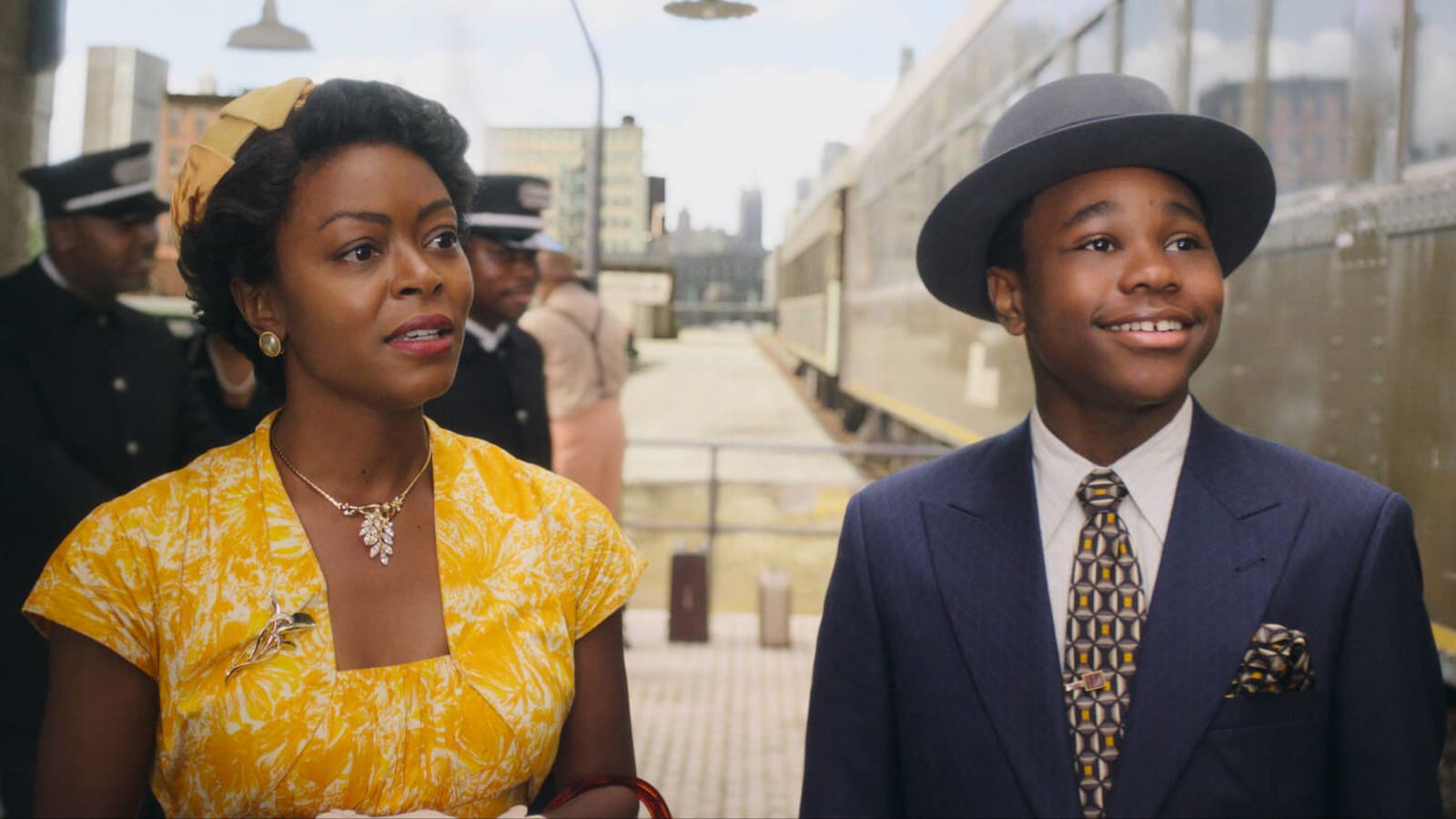
 +
+


